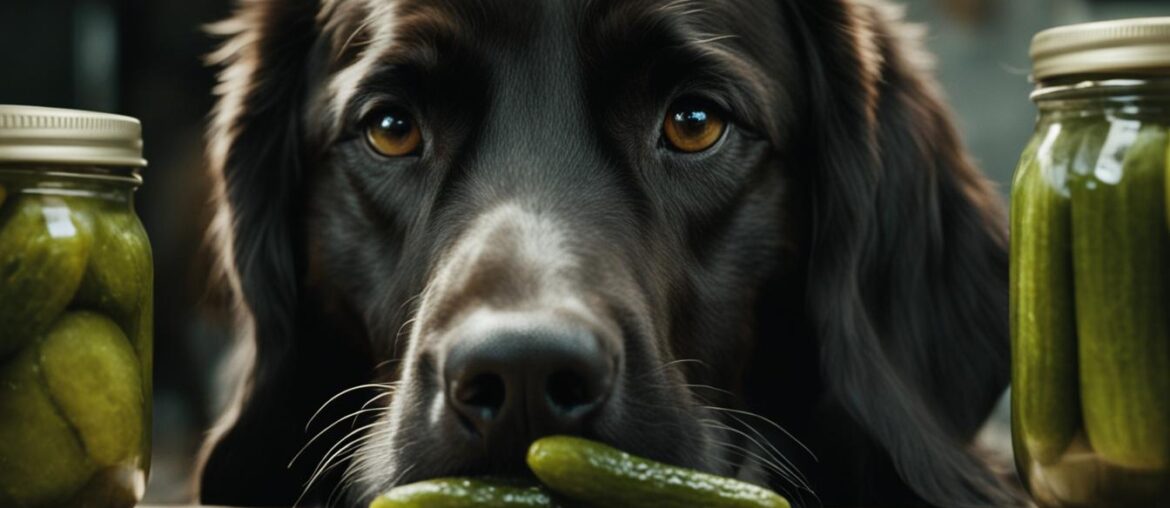As dog owners, we often find ourselves wondering if certain human foods are safe for our furry friends. One such food that comes to mind is pickles. It’s not uncommon to see dogs eyeing our plates, hoping to get a taste of what we’re eating. But are pickles a suitable addition to their diet?
Pickles are cucumbers that have been preserved in a salt-water brine, giving them their distinctive flavor. While cucumbers themselves can be a healthy snack for dogs, pickles come with a few caveats.
Before feeding your dog pickles, it’s crucial to consider the sodium content and the specific ingredients used in the pickling process. Too much sodium can have adverse effects on your dog’s health, especially for those with underlying medical conditions.
Additionally, some pickles may contain ingredients such as garlic, onions, or spices like cinnamon and nutmeg, which can be harmful or even toxic to dogs. As responsible pet owners, it’s essential to be mindful of what we offer as treats or snacks.
While pickles may not be the best choice for your dog, there are healthier alternatives to consider. Plain cucumbers offer similar nutritional benefits without the added sodium and potentially harmful ingredients found in pickles.
Key Takeaways:
- While pickles may not be toxic, they are high in sodium and may contain harmful ingredients for dogs.
- Plain cucumbers are a healthier alternative to pickles as a snack for dogs.
- Consult with your veterinarian for personalized advice on your dog’s diet.
- Be cautious of ingredients commonly used in pickles that can be toxic to dogs, such as garlic and onions.
- Monitor your dog’s sodium intake, especially if they have any underlying medical conditions.
Can Dogs Have Pickles?

When it comes to pickles, many dog owners wonder if their furry friends can enjoy this tangy treat. Let’s delve into the topic and explore whether pickles are suitable for dogs.
Pickles are cucumbers preserved in a salt-water brine, giving them their distinct flavor. However, this preservation process results in a high sodium content, which can be problematic for dogs.
It’s important to note that different types of pickles may contain ingredients that are unhealthy or toxic for dogs. Garlic and onions, for example, are common additions to pickles but can be harmful to our canine companions. These ingredients should be avoided in a dog’s diet due to their potential toxicity.
While pickles aren’t necessarily toxic to dogs, they are not the best choice to include in their diet. The high sodium content can have negative effects on a dog’s health, particularly if they consume pickles regularly or in large quantities.
Are Pickles Safe for My Dog?
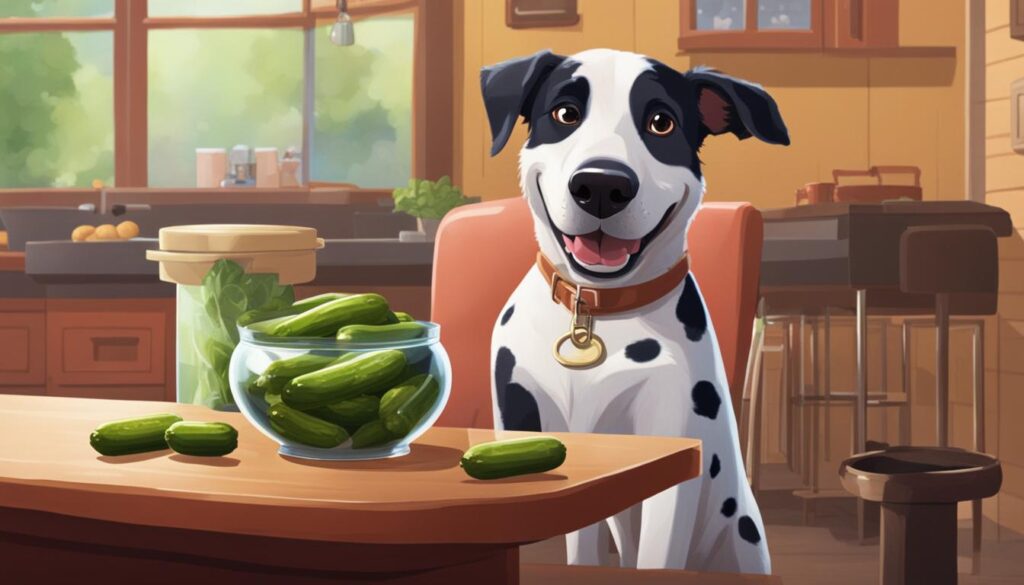
When it comes to pickles and dogs, safety is a primary concern. While pickles may seem harmless, their high sodium content can be especially problematic for dogs, especially those with underlying medical conditions. Consuming a large amount of sodium in a short amount of time can have adverse health effects on our furry friends.
Excessive sodium intake can lead to various side effects in dogs, including:
- Seizures
- Excessive thirst
- Vomiting
- Diarrhea
- Loss of balance
These symptoms can cause discomfort and potential harm to your dog’s overall well-being. Therefore, it’s crucial to closely monitor your dog’s sodium intake and be mindful of the amount of pickles or other high-sodium foods they consume.
If your dog has a pre-existing medical condition, such as kidney disease, heart problems, or hypertension, it’s even more vital to limit their sodium intake. Excess sodium can worsen these conditions and potentially lead to further complications.
To ensure the safety of your dog’s diet, it’s always recommended to consult with your veterinarian. They can provide individualized guidance and advice based on your dog’s specific needs, taking into account any health conditions or dietary restrictions.
Remember, while a tiny bite of pickle may not immediately harm your dog, it’s crucial to consider the potential health effects and prioritize their overall well-being.
Expert Quote:
“Dogs have different nutritional needs compared to humans, and their bodies process certain foods differently. High-sodium foods like pickles can put unnecessary strain on their organs and adversely impact their health. It’s best to stick to dog-friendly treats and consult with a veterinarian to ensure a balanced diet for your pet.”
Benefits of Cucumbers for Dogs
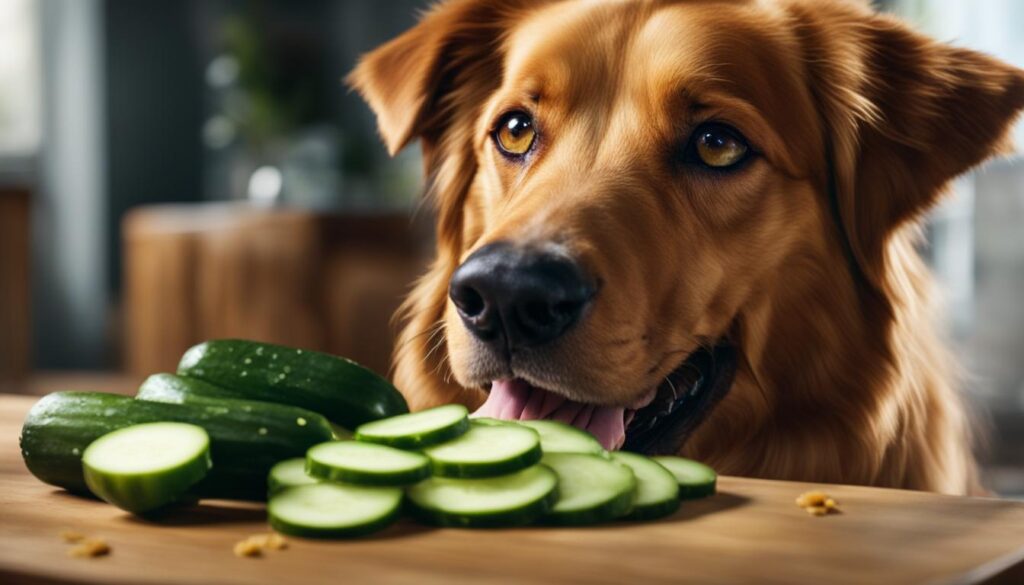
As a responsible dog owner, it’s important to provide your furry friend with nutritious and safe treats. While pickles may not be the healthiest option for dogs due to their high sodium content, plain cucumbers offer a refreshing and beneficial alternative. Cucumbers are packed with vitamins and minerals that can support your dog’s overall well-being. Let’s explore the benefits of cucumbers for dogs:
Vitamins and Minerals
Cucumbers are a good source of vitamin A, which promotes healthy vision and a strong immune system in dogs. They also contain vitamin K, which is essential for blood clotting and proper bone health. Additionally, cucumbers provide antioxidants that help protect your dog’s cells against damage from harmful free radicals.
Hydration and Digestion
Cucumbers have a high water content, which makes them a hydrating snack for dogs, especially during hot summer months. Staying hydrated is important for maintaining a healthy body temperature and supporting proper organ function. The fiber in cucumbers can also aid in digestion and promote regular bowel movements for your dog.
Low-Calorie and Weight Management
If you’re looking for a low-calorie treat option for your dog, cucumbers are an excellent choice. They are low in calories but still provide a satisfying crunch that your dog will enjoy. Adding cucumbers to your dog’s diet can help with weight management, making them a healthy snack option for dogs on a weight loss plan.
Refreshing and Delicious
Cucumbers have a refreshing taste and texture that many dogs find appealing. They can be a great addition to your dog’s meal or a standalone treat. Whether you serve them plain or freeze them into cucumber popsicles, your dog is sure to enjoy this healthy snack option.
Remember, when feeding cucumbers to your dog, it’s important to wash them thoroughly and remove the seeds if they pose a choking hazard. As with any treat, moderation is key to prevent overfeeding and maintain a balanced diet for your dog.
| Benefits of Cucumbers for Dogs |
|---|
| Vitamins and Minerals |
| Hydration and Digestion |
| Low-Calorie and Weight Management |
| Refreshing and Delicious |
Dangers of Pickles for Dogs
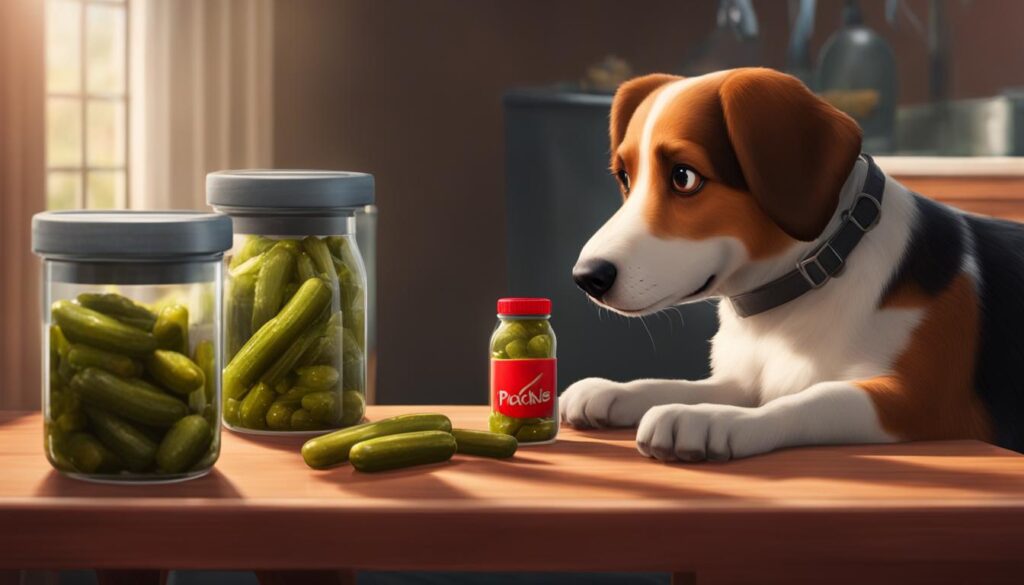
While pickles may be a tempting treat for your furry friend, it’s important to be aware of the potential dangers they can pose to dogs. Keep in mind that not all pickles are created equal, and certain types may contain ingredients that are harmful to your dog’s health.
The Problem with Sweet Pickles
Some pickles, particularly sweet pickles, can be a concern for dogs due to their high sugar content. Just like with humans, excessive sugar intake can lead to various health issues for dogs, including obesity and dental problems. This is particularly problematic for dogs with pre-existing conditions such as diabetes or weight issues.
The Risks of Garlic and Onions
Another potential danger of pickles is the presence of ingredients like garlic and onions. These ingredients are known to be toxic to dogs and can cause a condition called hemolytic anemia, which can lead to the breakdown of red blood cells and ultimately affect your dog’s overall health.
The Impact of Spices
In addition to garlic and onions, the spices used in pickles, such as cinnamon and nutmeg, can also pose a risk to dogs. These spices have the potential to cause gastrointestinal upset, including symptoms like nausea, vomiting, or diarrhea, in some dogs.
| Type of Pickle | Ingredients | Potential Health Risks |
|---|---|---|
| Sweet Pickles | High sugar content | Weight gain, dental issues, aggravation of diabetes |
| Pickles with Garlic and Onions | Garlic, onions | Hemolytic anemia, overall health problems |
| Pickles with Spices | Cinnamon, nutmeg | Gastrointestinal upset |
Alternatives to Pickles for Dogs
If you’re looking for a healthy snack option to share with your dog, plain cucumbers are a better choice than pickles. Cucumbers offer similar nutritional benefits without the added sodium and potentially harmful ingredients found in pickles.
Cucumbers are a hydrating and low-calorie vegetable that can provide your dog with vitamins and minerals. They are rich in vitamin K, vitamin C, and potassium, which are essential for your dog’s overall health and well-being. Additionally, cucumbers have a high water content, which can help keep your dog hydrated, especially during hot summer months.
When introducing cucumbers to your dog’s diet, it’s essential to do so gradually and in moderation. Start by offering small cucumber slices as a treat or mix them with your dog’s regular food to add some variety. Monitor your dog for any signs of digestive upset or allergies.
Benefits of feeding cucumbers to dogs:
- Hydration: Cucumbers have a high water content, helping to keep your dog hydrated.
- Vitamins and minerals: Cucumbers are a good source of vitamin K, vitamin C, and potassium.
- Low in calories: Cucumbers are a low-calorie snack option for dogs.
- Refreshing treat: The crisp texture and mild taste of cucumbers can be a refreshing treat for dogs.
“Plain cucumbers offer a fresh and nutritious alternative to pickles for dogs, providing hydration and essential vitamins and minerals.”
Always consult with your veterinarian before introducing any new foods into your dog’s diet, including cucumbers. While cucumbers are generally safe for dogs, individual dietary needs and health conditions may vary.
| Pickles | Cucumbers |
|---|---|
| High in sodium | Low in sodium |
| Potentially harmful ingredients | No potentially harmful ingredients |
| May cause digestive upset | Gentle on the digestive system |
| High calorie content | Low calorie content |
The Dill Pickle Debate
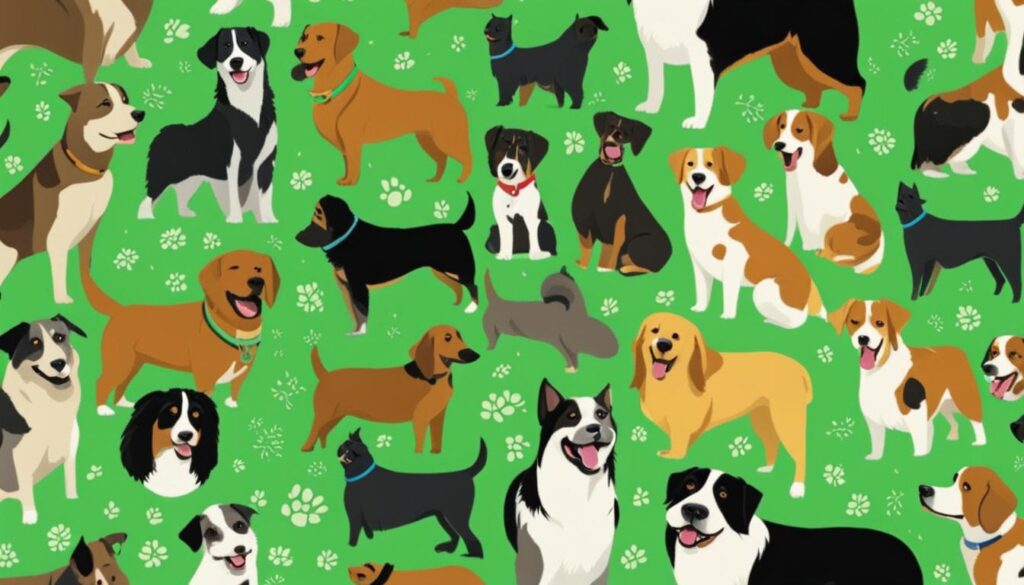
Dill pickles can be a source of debate when it comes to dogs. While dill itself is safe for dogs to eat and can offer some health benefits, the pickling process and high sodium content in dill pickles can be problematic for our furry friends.
When it comes to nutritional value, the pickling process negates most of the benefits that dill would provide on its own. Dill pickles are typically soaked in a brine solution that contains high levels of sodium. This can be harmful to dogs, especially those with underlying medical conditions that may be sensitive to sodium intake. Consuming too much sodium can lead to dehydration, kidney issues, and other health problems in dogs.
In addition to the sodium content, dill pickles may also contain ingredients like garlic and onions, which are toxic to dogs. These ingredients can cause digestive upset and even anemia in our canine companions. It’s important to avoid feeding dill pickles that contain these harmful ingredients to your dog.
Instead of feeding your dog dill pickles, a safer alternative is to use fresh dill as a seasoning for your dog’s regular food. Fresh dill can provide some of the health benefits, such as freshening their breath and offering antioxidants, without the added sodium and harmful ingredients found in pickles.
Remember to always consult with your veterinarian before introducing any new foods into your dog’s diet, including dill or dill pickles. They can provide personalized advice based on your dog’s specific needs and health conditions.
| Dill Pickles for Dogs | Potential Health Concerns |
|---|---|
| Negates nutritional value of dill | Pickling process removes most benefits |
| High sodium content | Potentially harmful for dogs with medical conditions |
| May contain toxic ingredients (garlic, onions) | Can cause digestive upset and anemia |
| Use fresh dill as a seasoning | Safer alternative for dogs |
Pickle Juice and Dogs
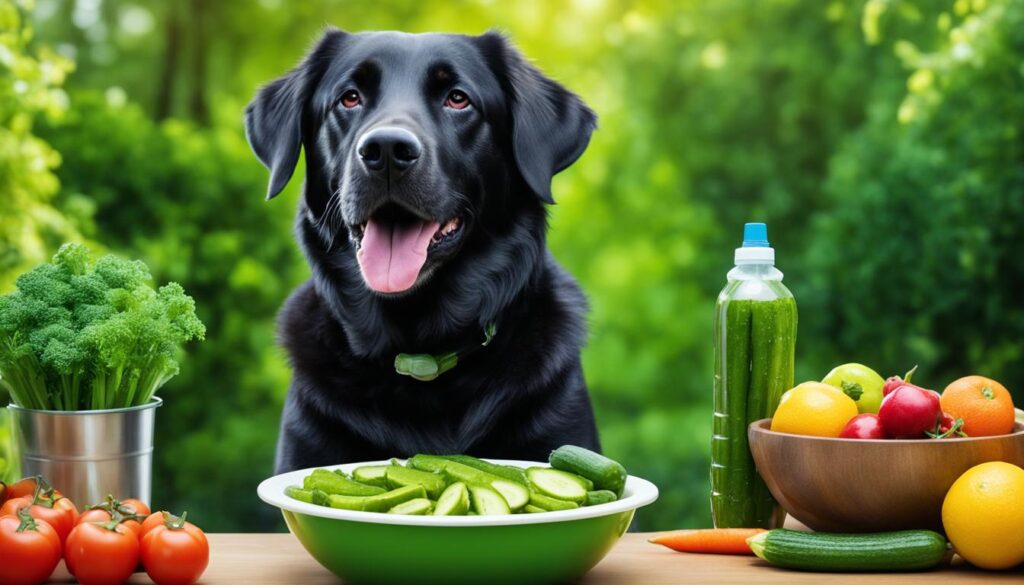
Pickle juice is not safe for dogs to consume. While some pet owners might be curious about whether dogs can drink pickle juice, it’s important to understand the potential risks involved.
Pickle juice contains high levels of salt, which can be harmful to dogs. Dogs have different sodium requirements than humans, and excessive salt intake can lead to complications such as dehydration, electrolyte imbalance, and kidney issues. Consuming pickle juice can also result in increased thirst and potentially cause gastrointestinal upset in dogs.
Furthermore, pickle juice may contain potentially toxic ingredients, such as garlic or onion, which are harmful to dogs. These ingredients can cause various health problems, including anemia and digestive issues.
If your dog accidentally drinks pickle juice, it’s essential to contact your veterinarian for guidance. They can assess the situation and provide appropriate advice based on your dog’s specific needs and health condition.
Wrapping Up
After considering the potential risks and benefits, it is clear that pickles are not the best choice for dogs. While pickles themselves are not toxic, their high sodium content can be harmful, especially for dogs with underlying medical conditions. Additionally, pickles may contain ingredients like garlic and onions that can be toxic to dogs.
To ensure the well-being of your furry friend, it’s recommended to choose healthier alternatives, such as plain cucumbers, for their snack options. Cucumbers offer similar nutritional benefits without the added sodium and potentially harmful ingredients found in pickles. However, it’s always important to consult with your veterinarian before introducing any new foods into your dog’s diet.
Remember, your veterinarian is the best source of advice when it comes to your dog’s dietary needs. They can provide personalized guidance based on your dog’s individual health requirements. By making informed choices and prioritizing your dog’s health, you can ensure that they have a happy and balanced diet.
FAQ
Can dogs eat pickles?
Pickles are not necessarily harmful to dogs, but they are high in sodium and may contain potentially harmful ingredients. It’s important to consider the sodium content and specific ingredients in pickles before feeding them to your dog.
Are pickles good for dogs?
While pickles may not be the healthiest option for dogs, plain cucumbers can be a healthy snack alternative. Cucumbers contain vitamins and minerals that are beneficial for dogs, such as vitamin A, vitamin K, and antioxidants. They can be a low-calorie and refreshing treat for your furry friend.
Are pickles safe for my dog?
Pickles can be safe for dogs in moderation. However, the high sodium content in pickles can be problematic, especially for dogs with underlying medical conditions. It’s important to monitor your dog’s sodium intake and consult with your vet.
What are the benefits of cucumbers for dogs?
Cucumbers offer similar nutritional benefits to pickles without the added sodium and potentially harmful ingredients. They contain vitamins and minerals that are beneficial for dogs, such as vitamin A, vitamin K, and antioxidants. They can be a low-calorie and refreshing treat for your furry friend.
What are the dangers of pickles for dogs?
The high sodium content in pickles can be problematic for dogs, especially those with underlying medical conditions. Consuming a large amount of sodium in a short amount of time can cause side effects such as seizures, excessive thirst, vomiting, diarrhea, or loss of balance. Some pickles may also contain toxic ingredients like garlic and onions.
What are some alternatives to pickles for dogs?
If you’re looking for a healthy snack option to share with your dog, plain cucumbers are a better choice than pickles. Cucumbers offer similar nutritional benefits without the added sodium and potentially harmful ingredients found in pickles.
Can dogs eat dill pickles?
Dill itself is safe for dogs to eat and can offer some health benefits, such as freshening their breath and providing antioxidants. However, the pickling process negates the nutritional value of dill, and the high sodium content in dill pickles can be harmful to dogs. It’s best to use fresh dill as a seasoning for your dog’s regular food instead of feeding them dill pickles.
Can dogs drink pickle juice?
No, pickle juice is not safe for dogs to consume. It contains high levels of salt and may also have potentially toxic ingredients. If your dog accidentally drinks pickle juice, it’s important to contact your veterinarian for guidance.
What is the conclusion about dogs and pickles?
While pickles are not necessarily toxic to dogs, they are high in sodium and may contain ingredients that can be harmful. It’s best to err on the side of caution and choose healthier alternatives, such as plain cucumbers, for your dog’s snack options. Always consult with your veterinarian for personalized advice on your dog’s diet.


